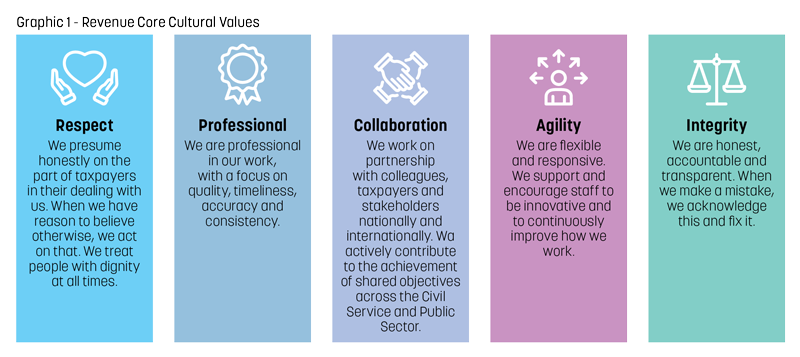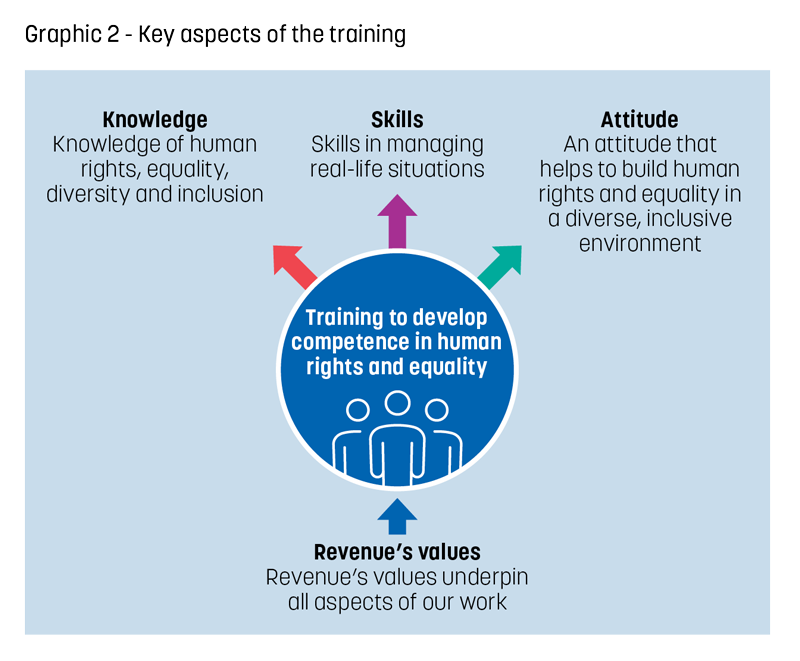Ensuring equality, diversity and inclusion: Ireland’s experience
21 June 2022
By the Office of the Revenue Commissioners in IrelandAt Revenue – the name of the Irish Tax and Customs Administration – we are committed to being an inclusive organisation that reflects the diversity of the community that we serve, acknowledges and values diversity, and places equality at the centre of everything we do. This policy supports Revenue in its objective of being a leading tax and Customs administration, trusted by the community and seen as an employer of choice in a competitive employment market.
This commitment is embedded within a wider programme of civil and public sector reform in Ireland. Since the adoption of Section 42 of the Irish Human Rights and Equality Commission Act, 2014, all public bodies are required to promote equality, prevent discrimination and protect the human rights of their employees, customers, service users and everyone affected by their policies and plans. This legal requirement, known as the Public Sector Equality and Human Rights Duty, also requires public bodies to assess, address and report on progress in relation to equality and human rights, in a manner accessible to the public.
This has taken place against a backdrop of significant change to the country’s demographic profile over the past 20 years. Allied to this new policy has been a modernisation of societal attitudes that is exemplified by the fact that Ireland was the first country to legalise same-sex marriage by way of a popular vote, in a referendum to amend its Constitution which was held in 2015.
We are currently updating our Equality, Diversity and Inclusion Policy to build upon our inclusive workplace culture where diversity is celebrated, and everyone is treated fairly. Our process has been informed by the WCO Gender Equality Organizational Assessment Tool (GEOAT). We are also updating our three-year Action Plan for the period 2022-2025 based on guidance provided by the Irish Human Rights and Equality Commission, which assists public bodies in developing policies and good practice in relation to human rights and equality. The Draft Action Plan addresses a series of recommendations related to data gathering and publication, training, customer and staff engagement, the creation of networks and the review of policies and procedures to identify and address equality issues. Some of these points are developed below.
Data gathering
One area where we focused some attention in 2021 was in relation to the diversity of our staff. As part of our staff engagement survey programme, for the first time we asked our staff, on an anonymised basis, for details of how they identify themselves under a number of headings, including:
- Gender, including gender identity
- Disability
- Sexual orientation
- Ethnicity
- Citizenship
This was the first time that such insights had been obtained from our staff, and this has allowed us to compare our staff demographics to those of the community that we serve using national census data. One of the findings was that there was a gap in terms of the representation of minority groups, albeit not as significant as may have been imagined.
In 2019, we conducted and published an analysis of gender and pay in Revenue. The analysis identified a gender pay gap of 16%. Gender imbalance in staff grades was identified as the leading cause of the gap, accounting for approximately three-quarters of it, while one quarter was due to different working patterns for men and women. It is expected that an update of our pay gap analysis, to be published shortly, will show further positive progress on this issue.
Dialogue and communication
Another initiative in terms of framing our policy has been the establishment of a management/union partnership group where staff can share their views regardless of their positions and hierarchical levels. We have also increased communication activities, with webinars and celebrations around the concepts of equality, diversity and inclusion. Other initiatives include an annual Diversity and Inclusion Week, “inclusive internships” tailored to people with specific requirements, accommodation for people with special needs, the establishment of the Revenue’s National Wellbeing Network, and Revenue’s LGBT+ Staff Network.
The inaugural Annual Diversity and Inclusion Week was launched in November 2021 by Revenue’s Chairman, Mr. Niall Cody. An internal newsletter was produced which featured details of support available to staff, information on our LGBT+ Network, Access Officers and Disability Liaison Officers, and role profiles from colleagues from various diverse backgrounds. It also provided customer service tips for dealing with Revenue’s diverse customer base. Several events were organised to celebrate the week, including an introduction to Irish Sign Language, a fireside discussion on diversity in the workplace, a presentation on Human Rights and Equality in the Public Sector, a quiz on unconscious bias, and wellbeing activities including desk pilates and a demonstration on healthy nutrition.
The Revenue’s National Wellbeing Network was established in July 2019 to support positive workplace wellbeing. The Network is made up of representatives at all levels across the organisation, with central support being provided by our Corporate Services Division. Workplace wellbeing can impact an individual’s feeling of inclusiveness. The role of the Network is to build a workplace environment that is supportive of living a healthy lifestyle. The Network formally launched “RevWell”, Revenue’s wellbeing programme, in 2020. RevWell has adopted the “5 Ways to Wellbeing”, an internationally-accepted, evidence-based model that is used around the world to support people in improving their wellbeing. RevWell has hosted a range of live webinars on wellbeing matters and important life milestones, with a particular focus, during 2021, on Covid-19 related wellbeing issues. In addition, we publish the RevWell newsletter on a quarterly basis, with tips on how to stay well in the mind and body with a focus on workplace wellbeing.
The Revenue’s LGBT+ Staff Network was set up in 2020 to help create a networking space for staff with minority sexual orientations and/or gender identities, and their allies. The Network works with other Civil Service Departments through the Civil and Public Service wide LGBT+ Employee and Ally Network, a key component of the National LGBTI+ Inclusion Strategy. In 2020, Revenue took part in the Digital Dublin Pride Festival’s virtual parade alongside other civil and public service LGBT+ Staff Networks, under the banner ‘Proud to work for Ireland’. The Revenue offices in O’Connell Street, Dublin, flew the Pride flag for the event and the Revenue Twitter account tweeted support for Pride 2020 alongside our LGBT+ Staff Network logo. We have established a dedicated intranet page and contact hub that enables our LGBT+ Staff Network to provide information and resources.
In 2021, the Network held an ‘Out at Work’ webinar with an LGBTQ+ activist and fellow civil servant who spoke about their experience as a transgender woman and the support received at work from the Property Registration Authority. The Pride Festival was celebrated again, by proudly flying the flag from a number of our offices, including our headquarters at Dublin Castle. The festival was celebrated virtually by hosting a number of webinar events, including a “lunch & learn” style ‘History of Pride’ talk.
Human Rights and Equality Training
To ensure that staff are trained and knowledgeable in respect of human rights and equality, in 2017 we developed specialised training in consultation with the Irish Human Rights and Equality Commission. We concentrated on building the knowledge, skills and attitudes needed to eliminate discrimination, promote equality and protect human rights.
Gender issues in society are in part visible and in part tacit. The training allows staff to develop an appreciation and understanding of the ways in which inequality can arise, the risks of prejudice, assumptions and stereotypes, and the potential for discrimination. It explores the potential for positive change and focusses on the roles of both the organisation and the individual in achieving this.
Revenue holds strong core values, including those of respect and integrity, which are key to challenging assumptions and to acquiring an equality and human rights perspective.


The training is rooted in these values and in the strength of their meaning and inspiration in everyday public service. It does not stand alone, but sits alongside our cultural values (set out in Graphic 1 below), our Customer and Employee Engagement Charters, and our equality, diversity and inclusion policy. Graphic 2 illustrates the key aspects of our training, focussing on the knowledge, skills and attitudes that are necessary to achieve competence, supported by Revenue’s values.
Staff initially participate in a brief human rights and equality module which forms part of the induction training for all new Revenue staff members. Specialised human rights and equality training is then provided to individual cohorts of staff, depending on the nature of their assignment within the organisation.
This training is managed by a qualified in-house trainer who has a background of working with groups that have experienced exclusion. It covers:
- equality and human rights principles,
- the domestic and international legal framework,
- discrimination,
- harassment,
- sexual harassment,
- victimisation.
A blended learning model is used to deliver training. Trainees engage and learn using a range of activities including theory, discussion, scenarios, case-studies and reflection. Trainees complete content-based material and knowledge checks online, and then attend a tutor-led, virtual-classroom session. The virtual session is discussion-based and interactive in nature, focussing on real-life experiences and scenarios. Participants contribute perspectives from their own experience and learning. They learn through dialogue and self-reflection, covering issues that affect both staff and external customers; they consider their own identity and explore the rich complexity of diversity. A key part of training involves challenging assumptions and stereotypes and exploring the benefits derived from diversity and inclusion.
- recognise human rights and equality issues and address these in their everyday work.
- recognise situations in which inequalities or discrimination could arise and identify ways to mitigate these issues.
- identify the potential role of stereotyping and assumptions in decision-making and ensure that decision-making is neutral and impartial in accordance with the ethical requirements of civil servants.
- recognise how discrimination arises and what tools can be used to address potential discrimination.
- communicate on the benefits of working in a diverse, inclusive organisation.
- understand the benefits of mainstreaming and the requirements of the Irish Public Sector Equality and Human Rights Duty.
- deliver excellent customer service.
Towards the future
Almost 3,000 (44%) of our serving staff have received this training. Human rights and equality training are now firmly embedded in Revenue. Revenue is committed to contributing to the work done in the WCO in this area, and will continue sharing its experience. Customs administrations interested in knowing more about our training are warmly invited to contact us.
More information
ssweeney@revenue.ie

